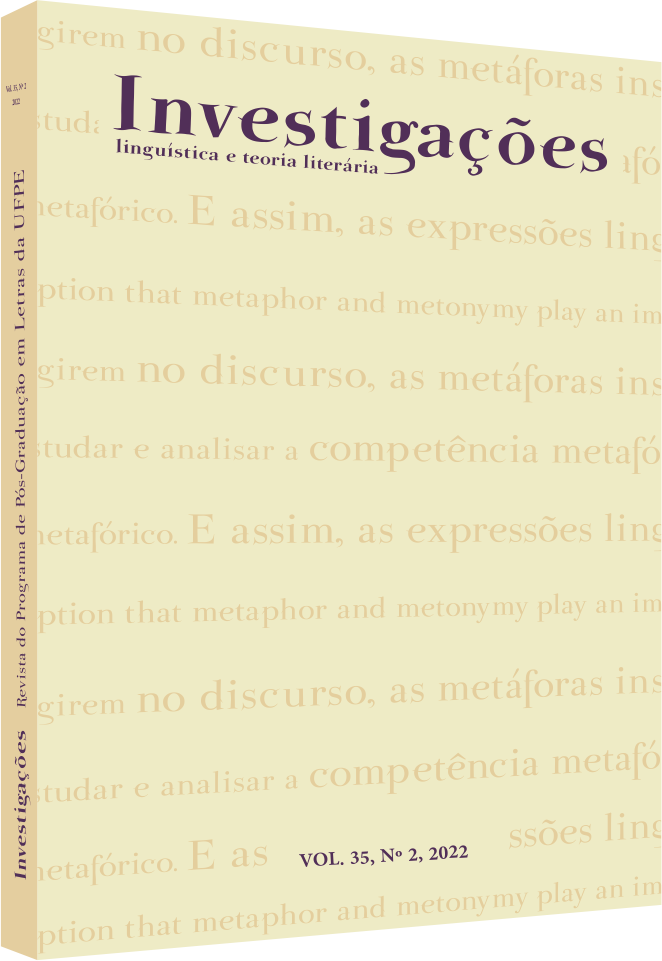A “vacina chinesa”: imaginários sociodiscursivos em torno da vacina Coronavac numa postagem do twitter
DOI:
https://doi.org/10.51359/2175-294x.2022.251248Keywords:
political discourse, social networks, COVID-19, vaccine.Abstract
This paper focuses on the interpretation of socio-discursive imaginaries present in a twitterpublication by pastor and federal deputy Marco Feliciano. This publication has as its theme the Coronavac vaccine. To analyze this object, we adopted as a theoretical and methodological axis the Semiolinguistic Discourse Analysis and the concept of socio-discursive imaginaries, based on Charaudeau (2008; 2017). Our analysis allowed us to describe and interpret the knowledge of beliefs, which may represent a spread of scientific denial characterized here as discrediting the effectiveness of the vaccine against COVID-19.References
AMORIM, A. de L. T. de. Poder e violação de direitos humanos no discurso neopentecostal:Uma análise da atuação político-midiática de Silas Malafaia e Marco Feliciano nas redes sociais online. Tese (Doutorado em Comunicação Social). Recife: Universidade Federal de Pernambuco, 2017.
ARISTÓTELES. Retórica. Tradução de Marcelo Silvano Madeira. São Paulo: Rideel, 2007.
BAKHTIN, M. (V. N. Volochinov). Marxismo e filosofia da linguagem. Tradução de Michel Lahud e Yara Frateschi Vieira. 7 ed. São Paulo: HUCITEC, 1995.
BOURDIEU, P. Les trois états du capital culturel. Actes de la Recherche en Sciences Sociales, [s. l.], n. 30, p.3-6, 1979.
BRUGGER, W. Proibição ou proteção do discurso de ódio? Algumas Observações sobre o Direito Alemão e o Americano. Revista de Direito Público,Brasília:Instituto Brasiliense de Direito Público,vol. 1,nº 15, p. 117-136, jan./fev./mar. 2007.
CAMARGO, K.; COELI, C. M. A difícil tarefa de informar em meio a uma pandemia. Physis: Revista de Saúde Coletiva. Rio de Janeiro, v. 30 (2), 2020.
CHARAUDEAU, P. Visadas discursivas, gêneros situacionais e construção textual.In: MACHADO, I. L.; MELLO, R. Gêneros reflexões em análise do discurso. Belo Horizonte: NAD/UFMG, 2004, p. 13-41.
CHARAUDEAU, P. Linguagem e discurso: modos de organização. Tradução de Angela M.S. Corrêa e Ida Lucia Machado. São Paulo: Contexto, 2008.
CHARAUDEAU, P.Discurso político. Tradução de Fabiana Komesu e Dilson Ferreira da Cruz. São Paulo: Contexto, 2006.
CHARAUDEAU, P. Os estereótipos, muito bem. Os imaginários, ainda melhor. Traduzido por André Luiz Silva e Rafael Magalhães Angrisano. Entrepalavras, Fortaleza, v. 7, p. 571-591, jan./jun. 2017.
CRONOLOGIA histórica da saúde. Funasa. Fundação Nacional de Saúde. 2017. Disponível em: http://www.funasa.gov.br/cronologia-historica-da-saude-publica. Acesso em 24 nov. 21.
KARHAWI, I. Influenciadores digitais: o Eu como mercadoria. In. SAAD-CORRÊA, E. N.; SILVEIRA, S. C. Tendências em comunicação digital.São Paulo: ECA-USP, 2016, p.38-58.
KLEINBERG, J.; EASLEY, D. Networks, Crowds, and Markets: Reasoning about a Highly connected World. Cambridge University Press, 2010.
PEREIRA, J. N. Estratégias retórico-discursivas no discurso de auto-ajuda. Anais do XI Simpósio Nacional e I Simpósio Internacional de Letras e Linguística: Múltiplas perspectivas em Linguística / José Sueli de Magalhães, Luiz Carlos Travaglia (organizadores). Uberlândia: EDUFU, 2008, p. 1523-1533.
PORTO, M. Y. Uma Revolta Popular Contra a Vacinação. Ciência e Cultura, Campinas, São Paulo, v. 55, n. 1, p. 1-2, 2003.
RECUERO, R. O capital social em rede: como as redes sociais na internet estão gerando novas formas de capital social. Contemporânea | comunicação e cultura, Salvador (UFBA), v. 10, n. 03, p. 597-617, set./dez. 2012.
SHAFER, G.; LEIVA, P. R. C.; SANTOS, R. H. Discurso de ódio. Da abordagem conceitual ao discurso parlamentar. Revista de informação legislativa, Brasília, v. 52, n. 207, p. 143-158, jul./set. 2015.
VERAS, T. J. de S. Negacionismo viral e política exterminista: notas sobre o caso brasileiro da COVID-19. Voluntas: Revista Internacional de Filosofia, Santa Maria, v. 11, p. e45, 2020.
Downloads
Published
How to Cite
Issue
Section
License
Copyright (c) 2022 Mônica Souza Melo

This work is licensed under a Creative Commons Attribution 4.0 International License.
Authors who publish with Revista Investigações agree to the following terms:
Authors retain copyright and grant the journal right of first publication with the work simultaneously licensed under the Creative Commons Attribution 4.0 International (CC BY 4.0) license that allows others to share the work with an acknowledgement of the work's authorship and initial publication in this journal.
Authors are able to enter into separate, additional contractual arrangements for the non-exclusive distribution of the journal's published version of the work (e.g., post it to an institutional repository or publish it in a book), with an acknowledgement of its initial publication in this journal.
You are free to:
Share — copy and redistribute the material in any medium or format for any purpose, even commercially.
Adapt — remix, transform, and build upon the material for any purpose, even commercially.
The licensor cannot revoke these freedoms as long as you follow the license terms.
Under the following terms:
Attribution — You must give appropriate credit , provide a link to the license, and indicate if changes were made . You may do so in any reasonable manner, but not in any way that suggests the licensor endorses you or your use.
No additional restrictions — You may not apply legal terms or technological measures that legally restrict others from doing anything the license permits.

